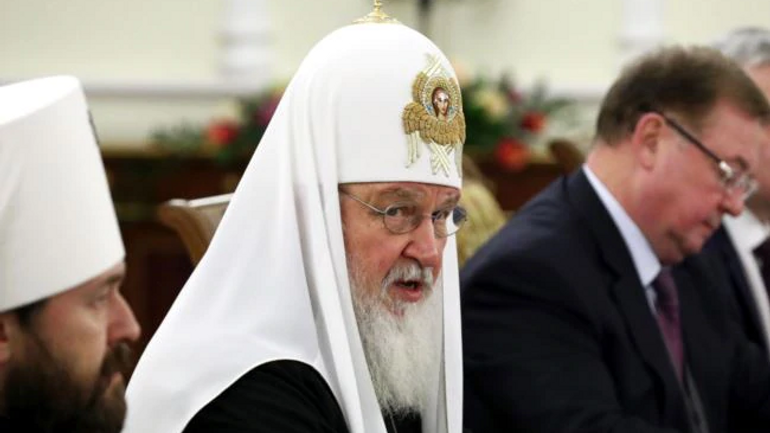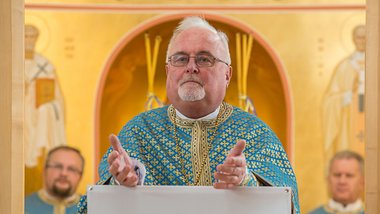Ukrainian activists demand that the “Russian World” ideologists led by Patriarch Kirill are sanctioned

In particular, we are referring to the Patriarch's Vicar Bishop, Metropolitan Hilarion (Gregory Alfeyev); permanent members of the Synod of the Russian Orthodox Church Metropolitans Onufriy (Orest Berezovsky) and Veniamin (Vitaly Tupeko), as well as a permanent member of the Synod of the UOC-MP Metropolitan Agafangel of Odessa and Izmail (Oleksiy Savvin).
"The impetus for this appeal was the fact that the role that the hierarchy of the Moscow Patriarchate has played and still plays in justifying and justifying the military aggression of the Russian political leadership (Transdniestria, Georgia, Ukraine) remains out of the attention of the international community," the initiators of the appeal say. "After all, the Moscow Patriarchate and personally the current Patriarch Kirill are the developers and long-term advocates of the Russian World ideology. This ideology has become an effective means of instilling in Russian society the idea of superiority and exclusivity of Russian culture, language, and Moscow Orthodoxy."
This teaching was condemned by the world-famous theologians because it is essentially a neo-imperial geopolitical and ideological doctrine that asserts Russian messianism and imperialism. Therefore, this latest heresy promotes Orthodox ethnophyletic fundamentalism (the superiority of the ethnic over the religious), totalitarianism and chauvinism. Ideology is used as an excuse for Russia's invasion of other states' territory to restore the former Soviet Union.
In fact, the teaching is the current social and political doctrine of Russia and proclaims that there is a certain super – National Russian-speaking space or a separate civilization, "Holy Rus", with a political center in Moscow, a common Russian language and a common Church - the Moscow Patriarchate. Its political leader is Putin, and its spiritual leader is Patriarch Kirill.
Such chauvinistic nationalist attitudes do not leave other peoples the right to their own language, culture, religion, or declare the latter to be less valuable, not worthy of development, prospects. A natural consequence of the Russian World policy is the gradual elimination of national languages, cultures, and those Orthodox communities that were not part of the Moscow Patriarchate in the territories occupied by Russia. Cases of harassment and persecution of religious leaders of non-Orthodox faiths who did not support the policy of the political leadership of the Russian Federation are also systemic.
"There are not isolated cases of open or covert cooperation between clergy of the Moscow Patriarchate in Ukraine and Belarus with the occupying Russian troops. Sometimes such cooperation goes beyond not only religious canons but also common sense or human morality," the initiators of the appeal note. "The chauvinistic Russian World has been and is being promoted with the help of Orthodox clergy. In war context, this poses a significant threat not only to the national security of Ukraine but also to the world as a whole."
Full text of the appeal:
Governments of the United States, Great Britain, Japan, and China,
member states of the European Union,
church and public institutions,
who cooperate with the Moscow Patriarchate
Statement by representatives of civil society of Ukraine
on the responsibility of the leadership of the Moscow Patriarchate
for unleashing aggressive wars, in particular, the annexation of Crimea
and the invasion of the Russian army in Ukraine
The necessity to put the leadership of the Moscow Patriarchate on the international sanction list
Ukrainians thank everyone who joined the formation and adoption of deterrent financial and political sanctions against the aggressor country, the Russian Federation. An important role in the general list of measures to counter the aggressor is also played by personal sanctions, which suppose personal responsibility on politicians and businessmen of the Russian Federation for the preparation and implementation of a military invasion of Ukraine and, consequently, for the deaths of thousands of innocent Ukrainians.
However, the role that the hierarchy of the Moscow Patriarchate has played and is still playing in justifying and promoting the military aggression of the Russian political leadership (Transdniestria, Georgia, Ukraine) remains beyond the focus of attention of the international community. After all, the Moscow Patriarchate and its current Patriarch Kirill are the developers and long-term leaders of the Russian World ideology. This ideology is based on Russian Orthodoxy's civilizational and moral foundations and, over time, has become an effective means of instilling in Russian society the idea of superiority and exclusivity of Russian culture, language, and Moscow Orthodoxy.
This teaching is condemned by the world-famous theologians because it is essentially a neo-imperial geopolitical and ideological doctrine that asserts Russian messianism and imperialism. Therefore, this latest heresy promotes Orthodox ethnophyletic fundamentalism (the superiority of the ethnic over the religious), totalitarianism and chauvinism. Ideology is used as an excuse for Russia's invasion of other states' territory to restore the former Soviet Union. In fact, the teaching is the current social and political doctrine of Russia and proclaims that there is a certain super – National Russian-speaking space or a separate civilization, "Holy Rus", with a political center in Moscow, a common Russian language and a common Church – the Moscow Patriarchate. Its political leader is Putin, and its spiritual leader is Patriarch Kirill.
Such chauvinistic nationalist attitudes do not leave other peoples the right to their own language, culture, religion, or declare the latter to be less valuable, not worthy of development, prospects. A natural consequence of the Russian World policy is the gradual elimination of national languages, cultures, and those Orthodox communities that were not part of the Moscow Patriarchate in the territories occupied by Russia. Cases of harassment and persecution of religious leaders of non-Orthodox faiths who did not support the policy of the political leadership of the Russian Federation are also systemic.
"There are not isolated cases of open or covert cooperation between clergy of the Moscow Patriarchate in Ukraine and Belarus with the occupying Russian troops. Sometimes such cooperation goes beyond not only religious canons but also common sense or human morality. The chauvinistic Russian World has been and is being promoted with the help of Orthodox clergy. In war context, this poses a significant threat not only to the national security of Ukraine but also to the world as a whole."
Based on the above, we ask everyone on whom it depends, to make efforts to put Patriarch Kirill of Moscow (Vladimir Gundyaev) and his entourage, who are directly involved in the development and promotion of the ideology of the Russian World, on the international sanctions list (with all the economic and political consequences). These are:
o Head of the Department for External Church Relations of the Moscow Patriarchate, Patriarchal Vicar, Metropolitan Hilarion (Gregory Alfeyev);
o permanent member of the Synod of the Russian Orthodox Church, Primate of the UOC-MP Metropolitan Onufriy (Orest Berezovsky);
o permanent member of the Synod of the UOC-MP, Metropolitan Agafangel of Odessa and Izmail (Oleksiy Savvin);
o permanent member of the Synod of the Russian Orthodox Church, Patriarchal Exarch of the Belarusian Exarchate of the Moscow Patriarchate Metropolitan Veniamin (Vitaly Tupeko).
Signed by:
1. Svyatoslav Chokalyuk, professor, director of the Institute of Church and Society.
2. Oleksandr Sagan, Professor, Head of the Department of Religious Studies at the Skovoroda Institute of Philosophy of the National Academy of Sciences of Ukraine
3. Anatoly Kolodny, Professor, President of the Ukrainian Association of Religious Scholars
4. Petro Mironenko, president of the Academy of Political Sciences of Ukraine
5. Viktor Yelensky, professor, Kuras Institute for political and ethnonational studies of the National Academy of Sciences of Ukraine
6. Maria Chorna, professor, interregional Academy of Personnel Management
7. Mykola Humenyuk, Yuria-Pharm Corporation
8. Andriy Ostrogrud, Kyivguma
9. Taras Antoshevsky, director of the Religious Information Service of Ukraine
10. Andriy Smirnov, professor, initiative group of clergy and laity "Ten Theses for the OCU"
11. Georgy Kovalenko, priest, rector of the Open Orthodox University of St. Sofia
12. Roman Novosad, NGO "Legal Protection of the Community", Chairman of the Management Board, Horokhiv City Council, member of the executive committee.
13. Halyna Sagan, doctor of historical sciences, Borys Hrynchenko Kyiv University.
14. Alla Medvid, Interregional Academy of Personnel Management
15. Serhiy Horbyk, archpriest. Orthodox Spiritual Center of St John the theologian, Chernivtsi
16. Lyudmyla Vansovska, All-Ukrainian Human Rights Defense Committee
17. Oksana Babak, Vinnichenko Central Ukrainian State Pedagogical University
18. Tetiana Havrilyuk, National Academy of Statistics, Accounting and Audit
19. Lyudmyla Fylypovych, Ukrainian Association of Religious Scholars, vice-president.
20. Dmytro Harkusha, Anti-Corruption Service
21. Hanna Kulagina-Stadnichenko. Department of Religious Studies of the Institute of Philosophy, NAS of Ukraine
22. Yaroslava Mishchenko, journalist, Ukrinform
23. Natalia Girardi
24. Andriy Nosenko, Institute of Church and Society, department manager
25. Yevhen Bystritsky, Institute of Philosophy of the National Academy of Sciences of Ukraine
26. Volodymyr Harkusha, Public Association "Sports Club "Trypillia", St Stephen Charity Foundation
27. Ivan Harat, priest
28. Zoya Donets, NRZU









